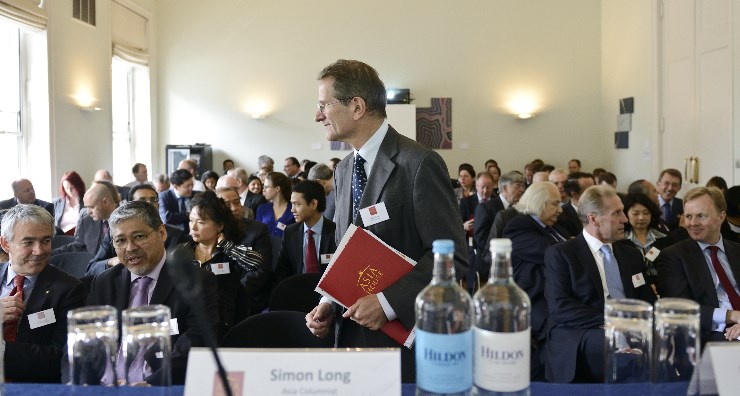Driving commercial and political engagement between Asia, the Middle East and Europe
Driving commercial and political engagement between Asia, the Middle East and Europe
Driving commercial and political engagement between Asia, the Middle East and Europe

The Asia House Signature Conference, Asia Trade – Shaping the 21st Century, organised in partnership with HSBC, saw 14 experts discuss the impact of trade on Asia’s relationship with the UK and examined how the rise of a new global currency will reshape the global monetary system.
Lord Green, the UK Minister for Trade & Investment, fresh from a two-week trade visit to Southeast Asia, emphasised the significance of Asian markets, declaring that “we in this country need to focus on ASEAN.” The Minister described the rise of the new Asian middle class, and the growing demand for infrastructure in expanding Asian cities. Britain, according to the Minister, is well placed to seize the opportunities created by Asian trade, with its knowledge of culture, education, PPP conditions, and the financial expertise provided by the City of London.
Dr Harsha Singh, Deputy Director General of the World Trade Organization, highlighted that Asia is more integrated with other global regions than any other continent. It is therefore dependent upon the stability of these other regions, but is also able to change its negotiating stance as Asia continues to grow.
James Emmett, the Global Head of Trade and Receivables Finance at HSBC, told the story of his 1970s trip to Bao’an County in China, that was renamed Shenzhen City in 1979, after becoming the country’s first Special Economic Zone. After witnessing the fast growth of Shenzhen, Emmett warned the audience not to underestimate the power of Asian trade. He concluded by affirming the rise of Asia’s intra-regional trade links, a new Asian middle class, and a global currency to challenge the US dollar. In the 21st Century, it is no longer necessary to measure which way the trade winds are blowing.
The Ambassador of the Philippines to the UK HE Enrique Manalo described how trade with ASEAN nations had enabled the Philippines to post 14 consecutive years of economic growth.
Stephen King, the Group Chief Economist at HSBC talked of the Silk Road, which he called “the last great opening of world trade”.
Simon Henry, Chief Financial Officer at Royal Dutch Shell emphasised that Asian governments were thinking thirty years ahead, and that energy changes in China and India would drive future markets. These remarks were supported by the other panellists, who confirmed that China was beginning to dictate the rules of trade, and that public perceptions were becoming increasingly important to markets in Asia.
John Saville, Director for Asia at UK Trade & Investment, reinforced the themes of infrastructure and changing consumer choices, suggesting methods of linking with businesses in Asia. He argued that “international markets are not a beauty contest” and that businesses with certain capabilities could achieve success in corresponding markets. Erica Ng, the Director-General of the Hong Kong Economic and Trade Office, highlighted the business versatility of Hong Kong, describing it as “a supermarket”, “a springboard”, and the 21st century Capital city of Asia. Sir Eric Peacock, Chairman of Buckley Jewellery, expanded on these themes, highlighting that partnerships and talent remain central to Asian trade.
The final panel focused on the rise of the Chinese currency, the Renminbi (RMB), and how it would impact on Asian trade. Professor Chris Dixon, the Head of Asia at the Global Policy Institute, discussed the end of the Washington Consensus, and the currency shift that was paving the way for China’s dominance in the international economic order. Ambassador of Thailand to the UK and Ireland, HE Pasan Teparak told how ASEAN nations were attempting to use local currencies for intra-regional export trade and how the rise of the Renminbi could create new jobs in the UK. This comment was supported by Bridget Walsh, the Head of UK & Ireland Greater China Business Services at Ernst & Young, who confirmed from her experience that British companies could get better deals when trading in RMB.
